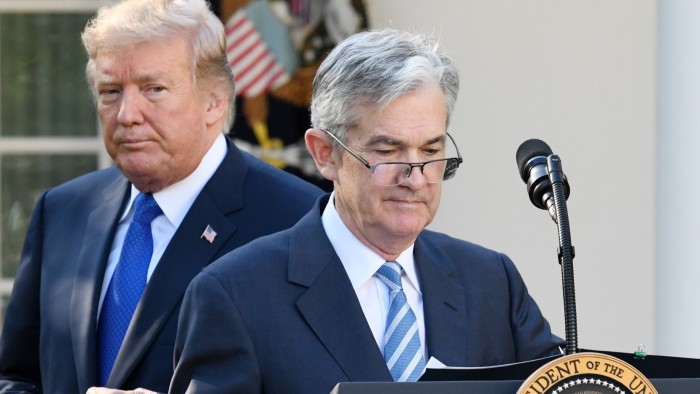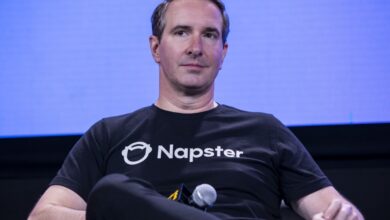Donald Trump needs Jay Powell

Unlock the White House Watch newsletter for free
Your guide to what the 2024 US election means for Washington and the world
Good morning. Rob here, back from a week in beautiful Santa Fe, tanned, rested, ready and tired of looking at turquoise jewellery. A wretched market yesterday gave me the reassuring sense that nothing changed in my absence. If I did miss anything, email me: robert.armstrong@ft.com.
Trump probably won’t try to force Powell out, because that would be a fantastically dumb thing to do
The market does not like it when the president threatens the chair of the Federal Reserve. Of course Donald Trump has groused about Jay Powell before, but yesterday’s rendition was more acidic than usual, and came after Trump’s adviser Kevin Hassett said the White House would “continue to study” ridding Trump of the meddlesome central banker. Stocks down, dollar down, short yields down, long yields up, implied volatility up, gold way up. Ick.
Expect the grousing to continue. But I don’t think Trump will try to fire Powell; I’d put the odds of it happening at about 10 per cent. I think this because it would be against Trump’s own interests, in straightforward ways.
Yesterday was just a taste of how the market would respond to a successful attempt to drag Powell out of his job before his term is up next May. I would expect the first-order market effects and second-order economic effects of ending Fed independence to be severe enough to drain the administration of the political capital it will need to get much done legislatively before the midterms, and to cost Trump’s party the House or Senate in that election. Grumbling can already be heard at the periphery of the Republican party about Trump’s economic policy. He doesn’t have infinite room to screw around.
(As an aside, if Trump were to declare his pick for the next Fed chair, and were chair-to-be Lackey McLickspittle to begin making policy pronouncements before taking office, that would be equivalent to firing Powell, and possibly more scary for markets).
It’s not only the move’s high risks that ought to dissuade Trump; the returns are low, too. The impact of destroying central bank independence can be disaggregated into the market shock and the effect on monetary policy. The market shock would come down to permanently lower stock valuations and higher bond term premiums — that is, lower stock and bond prices, all else equal — because the expected volatility of inflation and rates would go up, independent of what the newly appointed chair did.
The new chair would presumably push for rate cuts. That may well be the right call. Tariffs’ negative impact on growth may overwhelm their inflationary effects. Or perhaps the inflationary effects would be one-time. It’s is hard to predict. But Trump would have paid for better monetary policy with a market shock that could easily cause a recession. Recessions take all the fun out of low rates. On the other hand, if cutting rates is the wrong decision, inflation would return and rates will have to go higher than they otherwise would have been, without diminishing the recession risks much. And there is also a significant cost to getting rid of Powell: not having a scapegoat if the economy continues to falter. If Trump gets a pet Fed chair, he owns every bit of whatever happens.
All this, in return for having your pick of Fed chair a year sooner than otherwise? No thanks. I think the risk/reward mix for forcing Powell out is terrible, and Trump will probably see that.
(By the way, I said above that the end of Fed independence would mean lower bond prices all else equal. But all else might not be. If the market shock is bad enough, the bond market might see right through the inflationary risks and into the recession, and bonds prices might rise immediately).
Having stated my prediction with such confidence, readers should know that the range of Wall Street opinion on this issue is wide. The chief investment officer at a very large wealth manager told me yesterday that the chances of Trump forcing Powell out were:
very low [as] it would certainly cause a flight of capital from the US. But Trump is frustrated and he’s unlikely to stop talking about it, and consequently, the markets will price in the paranoia.
A Wall Street strategist agreed:
I put odds around zero. When you see John Kennedy, a senior Republican on the [Senate] Banking Committee, weighing in over the weekend that he backs Powell and Fed independence, you get the sense they fully realise and wanted it communicated immediately that firing Powell would be a body slam to Treasuries and the dollar.
On the other hand, a senior executive at a large quant fund thinks it’s evens odds — and that it doesn’t matter much:
50/50 . . . Trump sorta wins either way. If there’s a bear market or a recession, he can blame Biden and Powell, whether he fires him or not. If there’s neither, he can take the credit, whether he fires him or not . . . If it happens, it will not be a surprise. Markets move on surprise. I think the talk of firing is already moving the market more than the reality would. I’m guessing that, if it happens, there’s a brief bounce. His replacement would be key, and the interim default would be [John] Williams [chair of the New York Fed], which merely implies more of the same
Another asset manager CIO thinks it’s more likely than not:
The odds are greater than 50 per cent. Trump has already shown that he has little regard for these things and is completely driven by retribution
Either way, the damage is done. Expect continued pressure on the dollar, rates and outflows. Increasingly, foreign investors are disenchanted and will continue to allocate away from US. [Foreign direct investment] is a very simple premise — 1) rule of law 2) political/structural stability 3) a trusted system in place to raise and arbitrate disputes. Three strikes on the US front.
I think there is plenty more damage left to do, and that Trump will ultimately recognise this, if he has not already. Betting markets, it is worth noting, put a 26 per cent chance on Powell being out before year end. I think that is too high.
One good read
When the M&A guys run law firms, law firms do what the government tells them to do.
FT Unhedged podcast

Can’t get enough of Unhedged? Listen to our new podcast, for a 15-minute dive into the latest markets news and financial headlines, twice a week. Catch up on past editions of the newsletter here.
https://www.ft.com/__origami/service/image/v2/images/raw/https%3A%2F%2Fd1e00ek4ebabms.cloudfront.net%2Fproduction%2F69b54733-f974-4a6a-b71d-2fa22b264eec.jpg?source=next-article&fit=scale-down&quality=highest&width=700&dpr=1
2025-04-22 05:30:57





